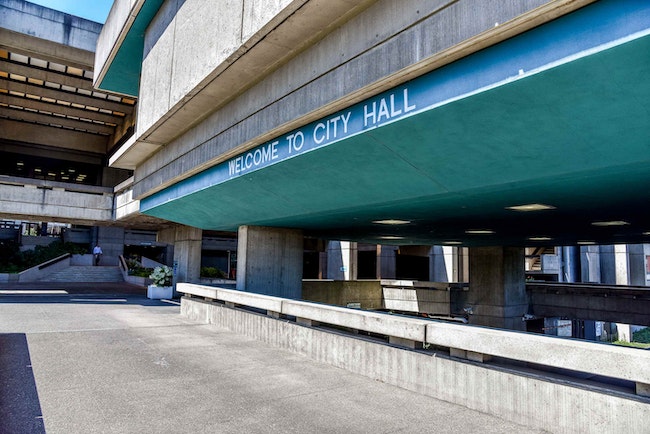As the Salem City Council prepares to vote on taxing workers paychecks without seeking voter approval, some area business leaders have voiced their opposition saying it would have undue burden on workers in the area.
The proposed tax would tax the average Salem worker $42 a month to add police and firefighter positions and continue services for unsheltered people, a rate of 0.814% that would apply to earnings above minimum wage. It would affect workers who live outside of Salem but perform work within city limits, a group that includes many state employees.
The Salem Area Chamber of Commerce, which represents over 1,000 businesses in the mid-WIllamette Valley, would like to see the issue taken to voters in November, according to a statement emailed to Salem Reporter by chamber CEO Tom Hoffert.
Hoffert said the group also takes issue with how the city has prioritized public safety and infrastructure funding in the budget.
“The small business community requests that local social service initiatives be financially reprioritized and funded only AFTER public safety and infrastructure have received adequate funding in the City’s annual budgeting,” Hoffert said in an email.
Oregon Business and Industry, the statewide chamber of commerce opposes the payroll tax outright, while local union leadership described the options ahead as lose-lose.
City leadership are pursuing a payroll tax, in addition to a recently approved increase to the city operations fee, to address its deficit. With expenses outpacing revenue, the city is set to run out of general funds by June of 2025.
The drafted payroll tax would generate an estimated $27.9 million per year, $10.5 million of which would go to sustain current operations at the police department, expand the homeless outreach team and hire an additional dozen officers for a community policing program downtown.
$6.5 million would go to maintain the fire department and hire 14 people to staff an incoming new fire station, which Chief Mike Niblock said would allow responders to arrive to emergencies faster and prevent burnout.
The tax would also include funding to keep the doors open at the newly built navigation center, which will provide shelter and assistance with social services and healthcare for 75 people, and does not have the means secured to operate beyond 2025, and the city’s microshelter system.
Homeless services to be funded by the tax are currently being paid for through federal Covid relief money, which expires in 2024.
The city’s budget committee opted to recommend the council pass the payroll tax without voter approval during a May 10 meeting, a decision councilors, who all sit on the committee, were split on.
Before the Salem Chamber’s Thursday statement, Hoffert spoke about the chamber’s concerns with payroll tax at the June 12 council meeting. He said the city made earnest efforts to engage the business community while developing the plan, but he feels that the conversations haven’t felt open.
“The business community, and likely the community as a whole, has not been presented with clarity on the implementation procedure for the to-be-discussed proposed payroll tax,” he said. “Yet this year’s budget is built on a substructure which necessitates additional revenues the next fiscal year.”
He said the business community’s ability to engage with the process has been hampered by changes, including to the proposed rate, the removal of minimum-wage earners and logistics for business owners to track how often their employees work within the city of Salem.
“It’s a daunting vision for local employers who are already struggling to operate post-pandemic, in a supply-chain challenged world with high inflation,” he said.
Several other business owners spoke out against the tax during the meeting, citing rising costs. They included Selina Barnes, the government affairs director for the Mid-Valley Association of Realtors, and Mike Erdmann, the CEO of the Home Builders Association of Marion & Polk Counties.
Hoffert said during the meeting that he’d like the city to reprioritize its commitment to community services and events.
People who work with the homeless community spoke in favor of the payroll tax during the meeting, including DJ Vincent, director of Church at the Park which operates the city’s micro shelters and safe parking.
He said they tracked 40 people who frequently used their services, and in the last year they saw an 80% reduction to emergency room visits and a 75% reduction in 911 calls, because they had shelter and primary care.
Hoffert said in an email to Salem Reporter that beyond believing the payroll tax should be taken to a vote, the Salem Chamber has not issued a position on whether it will campaign for or against the payroll tax.
Oregon Business Industry, the statewide chamber of commerce, has submitted a letter to the city opposing the tax entirely.
“We’ve gone from a state with, arguably, a lower tax environment to a state with a significantly high tax environment. That hurts our ability to compete, it disincentivizes the things we want more of,” Scott Bruun, the group’s vice president for government affairs, told Salem Reporter
Bruun said from a statewide perspective, the payroll tax would make it harder for Salem-based employers to attract workers from outside the area.
Salem Health, the largest private employer in the city, is maintaining a neutral position on the payroll tax, said spokeswoman Lisa Wood.
“We have informed and educated our employees, encouraging them to voice their opinions to the City of Salem through its public hearings and other points of contact. Since the tax has direct impact on all eligible employees, theirs is most salient voice to be heard by the City of Salem in whether to enact the proposed tax,” Wood said in an email to Salem Reporter Friday.
Kathy Knock, president of AFSCME Local 2067 which represents 600 City of Salem employees, said the payroll tax puts the union between a rock and a hard place.
Without the payroll tax, if city revenue issues lead to cuts in parks and libraries, she said 60 union employees could be impacted. But city workers will also have to pay the tax.
The union doesn’t have an official position at this point, she said. The union’s board will meet on July 7, where it may discuss the topic.
“Many people that I’ve talked to are already working second jobs to make ends meet with the high inflation we’ve had for three years,” she said. “But the alternative is a bunch of people are going to lose their jobs. And the city will lose some very valued services.”
The city of Salem meets Monday, June 26, in-person at the city council chambers, 555 Liberty St. S.E. room 220, with the meeting also available to watch online.
Monday’s meeting will include a first-reading of the proposed payroll tax, with a planned public hearing during the council meeting on July 10.
The meeting will be livestreamed on Capital Community Media’s YouTube channel, with translation to Spanish and American Sign Language available. Anyone may attend the meeting to listen or comment.
The public comment portion of the meeting takes place after opening exercises, such as roll call and the Pledge of Allegiance, and residents are invited to comment on any topic, whether it appears on the agenda or not. If a public comment does not relate to an agenda item, it may be saved for the end of the meeting.
To comment remotely, sign up on the city website between 8 a.m. and 2 p.m. on Monday.
For written comments, email [email protected] before 5 p.m. on Monday, or on paper to the city recorder’s office at the Civic Center, 555 Liberty St. S.E., Room 225. Include a statement indicating the comment is for the public record.
Contact reporter Abbey McDonald: [email protected] or 503-704-0355.
SUPPORT OUR WORK – We depend on subscribers for resources to report on Salem with care and depth, fairness and accuracy. Subscribe today to get our daily newsletters and more. Click I want to subscribe!

Abbey McDonald joined the Salem Reporter in 2022. She previously worked as the business reporter at The Astorian, where she covered labor issues, health care and social services. A University of Oregon grad, she has also reported for the Malheur Enterprise, The News-Review and Willamette Week.









